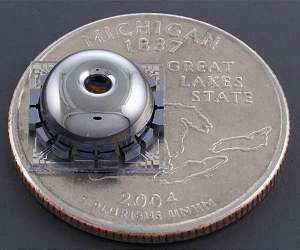Hackers take on Raw Galileo challenge
Hackers came together online at the Raw Galileo 24-hour hackathon over the weekend to develop innovative solutions that leverage Galileo raw measurements for use on Android-based mobile devices. Organized by the University of Nottingham and the European GNSS Agency (GSA) as a part of the FLAMINGO project, the hackathon challenged the participants to develop solutions addressing two key challenges, enticing them with a prize pot of EUR 6000.
In the first of these, the FLAMINGO Navigation Challenge, the hackers were tasked with developing solutions that use Galileo and the high accuracy positioning and navigation services provided by FLAMINGO on an Android-based mobile device to enhance their existing applications or to develop new ones.
First prize of EUR 1 800 in this challenge went to #VastMapping, an app that leverages Galileo and FLAMINGO accuracy to provide real time computer vision for asset mapping and management. Targeted at construction sites, the app will reduce costs due to loss of materials, support sharing of equipment and optimise on-site resource use.
While working on this challenge, the developers had access to the FLAMINGO API, which is designed to improve the accuracy of GNSS positioning in smartphones and IoT devices by utilising FLAMINGO services.
Raw drive to innovation
“Access to raw measurements and advanced positioning solutions, like the FLAMINGO API, means that developers are now able to utilize services that were up until very recently available only in professional receivers,” said GSA Market Development Innovation Officer Martin Sunkevic.
“The drive towards innovation that this access generates was very much in evidence at the Raw Galileo hackathon, and we were very impressed with the ideas and solutions that were developed,” he said.
The second track – the FLAMINGO Verified Location Challenge – was oriented at demonstrating non-navigation use of GNSS raw measurements. This challenge targeted experienced programmers with no particular GNSS experience, with a view to seeing how they utilise raw measurements in a more complex ecosystem. The goal for the teams was to create their own system (user terminals + backend) that use GNSS raw measurements to verify position, using freely available tools and source code.
First prize of EUR 1200 in this challenge went to the ClaimR app – a verified location signing service. Service providers currently request customers to verify their location when providing a service. This app verifies the customer’s location for the service provider and might be a useful tool against apps providing fake location.
The Horizon 2020 FLAMINGO project is addressing the current trend for high precision positioning and navigation in the mass market and is working to achieve 50 cm accuracy on smartphones and wearables using PPP/RTK correction techniques applied to GNSS raw measurements. Within the project a special application interface (API) was developed for mobile developers, who can use it to test and use this increased accuracy.
GNSS raw measurements
With the release of Android 7 (Nougat) in 2016, Google made GNSS raw measurements available to smartphone users, allowing them to improve their positioning accuracy. Aware of the benefits to developers that these raw measurements offer, in June 2017 the GSA launched a GNSS Raw Measurements Task Force to share knowledge and expertise on Android raw measurements and their use, including their potential for robustness and high accuracy positioning techniques relevant to mass market applications.
The Task Force includes more than 150 international GNSS experts, scientists and market players, all of whom are dedicated to promoting a wider use of these raw measurements. For more information on the Task Force, its members and their work, click here.
Related Links
Raw Galileo at ESA
GPS Applications, Technology and Suppliers
|
We need your help. The SpaceDaily news network continues to grow but revenues have never been harder to maintain. With the rise of Ad Blockers, and Facebook – our traditional revenue sources via quality network advertising continues to decline. And unlike so many other news sites, we don’t have a paywall – with those annoying usernames and passwords. Our news coverage takes time and effort to publish 365 days a year. If you find our news sites informative and useful then please consider becoming a regular supporter or for now make a one off contribution. |
||
|
SpaceDaily Contributor $5 Billed Once credit card or paypal |
SpaceDaily Monthly Supporter $5 Billed Monthly paypal only |
|

![]()
Small, precise and affordable gyroscope for navigating without GPS
Ann Arbor MI (SPX) Mar 24, 2020
A small, inexpensive and highly accurate gyroscope, developed at the University of Michigan, could help drones and autonomous cars stay on track without a GPS signal.
“Our gyroscope is 10,000 times more accurate but only 10 times more expensive than…
